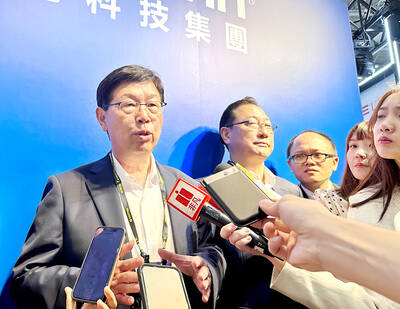International hotel chain Marriott International Inc yesterday held a soft opening for its first property in New Taipei City’s Linkou District (林口) in a bid to take advantage of emerging hospitality demand in the area.
The new hotel, under the brand Four Points by Sheraton Linkou (林口亞昕褔朋喜來登飯店), is a joint venture with local developer YeaShin International Development Co (亞昕國際開發), which is seeking to diversify its income sources by tapping into the hotel business.
Four Points by Sheraton is a brand of upscale hotels catering to business travelers and small conventions.
The hotel expects to achieve an occupancy rate of 50 percent with an average room rate of NT$3,999 until the end of this year, company communication officials said.
“The property of 165 guestrooms would move toward its target, aided by the blessing of an international hotel brand and a convenient location,” a marketing official said by telephone.
The facility is right across from the Airport MRT line’s Linkou Station and within walking distance of Mitsui Outlet Park and Linkou Chang Gung Memorial Hospital, the official said.
With 18 floors above ground and four below, the hotel features two restaurants, a lounge bar and banquet rooms, which would meet the conference demand of nearby companies, the official said.
Inbound business travelers might want to stay at Four Points Linkou after landing at Taiwan Taoyuan International Airport, as the hotel is only 20 minutes’ ride from the airport and downtown Taipei, the official said.
The property might help boost YeaShin’s revenue this year, with the effect likely to be more evident next year.
The Taipei-based developer posted net income of NT$723.02 million (US$23.62 million) in the first quarter, or earnings per share of NT$2.28, company data showed, after recognizing profits from new apartment complexes in Linkou.
It was the second consecutive quarter of gains after three straight quarters of losses, company data showed.
The company plans to launch new housing projects in New Taipei City later this year.
YeaShin shares have risen 13.14 percent so far this year, outperforming the construction sector’s 4.82 percent gain, according to the Taipei Exchange, on which companies with small to medium-sized capitalization are listed.

Taiwan Transport and Storage Corp (TTS, 台灣通運倉儲) yesterday unveiled its first electric tractor unit — manufactured by Volvo Trucks — in a ceremony in Taipei, and said the unit would soon be used to transport cement produced by Taiwan Cement Corp (TCC, 台灣水泥). Both TTS and TCC belong to TCC International Holdings Ltd (台泥國際集團). With the electric tractor unit, the Taipei-based cement firm would become the first in Taiwan to use electric vehicles to transport construction materials. TTS chairman Koo Kung-yi (辜公怡), Volvo Trucks vice president of sales and marketing Johan Selven, TCC president Roman Cheng (程耀輝) and Taikoo Motors Group

Among the rows of vibrators, rubber torsos and leather harnesses at a Chinese sex toys exhibition in Shanghai this weekend, the beginnings of an artificial intelligence (AI)-driven shift in the industry quietly pulsed. China manufactures about 70 percent of the world’s sex toys, most of it the “hardware” on display at the fair — whether that be technicolor tentacled dildos or hyper-realistic personalized silicone dolls. Yet smart toys have been rising in popularity for some time. Many major European and US brands already offer tech-enhanced products that can enable long-distance love, monitor well-being and even bring people one step closer to

RECORD-BREAKING: TSMC’s net profit last quarter beat market expectations by expanding 8.9% and it was the best first-quarter profit in the chipmaker’s history Taiwan Semiconductor Manufacturing Co (TSMC, 台積電), which counts Nvidia Corp as a key customer, yesterday said that artificial intelligence (AI) server chip revenue is set to more than double this year from last year amid rising demand. The chipmaker expects the growth momentum to continue in the next five years with an annual compound growth rate of 50 percent, TSMC chief executive officer C.C. Wei (魏哲家) told investors yesterday. By 2028, AI chips’ contribution to revenue would climb to about 20 percent from a percentage in the low teens, Wei said. “Almost all the AI innovators are working with TSMC to address the

FUTURE PLANS: Although the electric vehicle market is getting more competitive, Hon Hai would stick to its goal of seizing a 5 percent share globally, Young Liu said Hon Hai Precision Industry Co (鴻海精密), a major iPhone assembler and supplier of artificial intelligence (AI) servers powered by Nvidia Corp’s chips, yesterday said it has introduced a rotating chief executive structure as part of the company’s efforts to cultivate future leaders and to enhance corporate governance. The 50-year-old contract electronics maker reported sizable revenue of NT$6.16 trillion (US$189.67 billion) last year. Hon Hai, also known as Foxconn Technology Group (富士康科技集團), has been under the control of one man almost since its inception. A rotating CEO system is a rarity among Taiwanese businesses. Hon Hai has given leaders of the company’s six